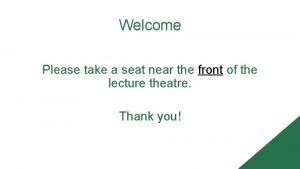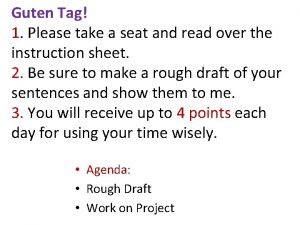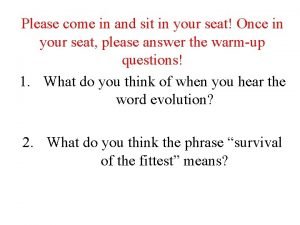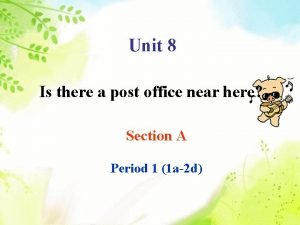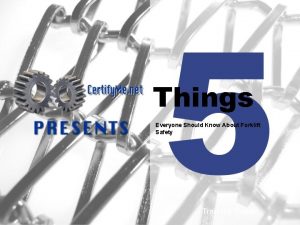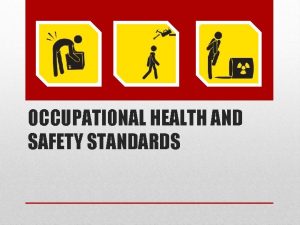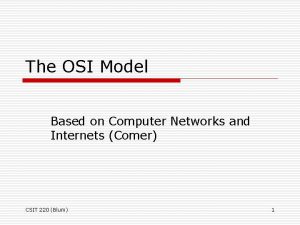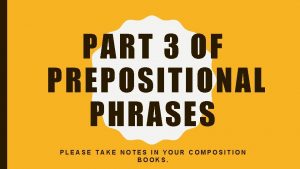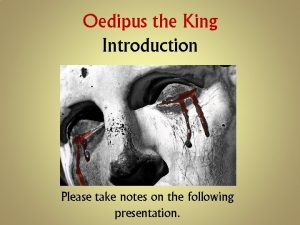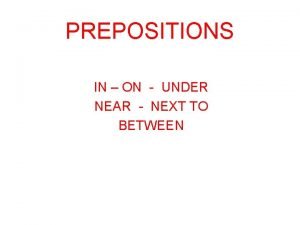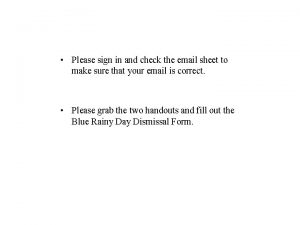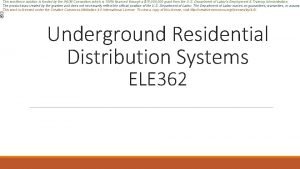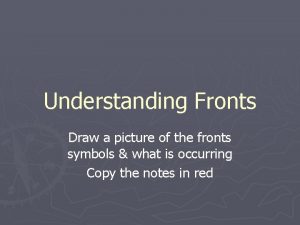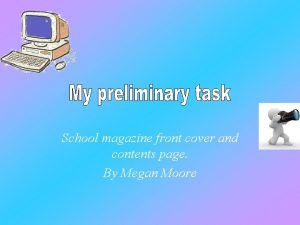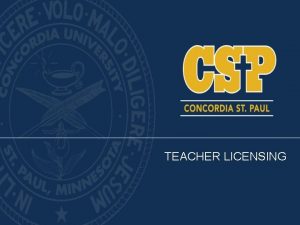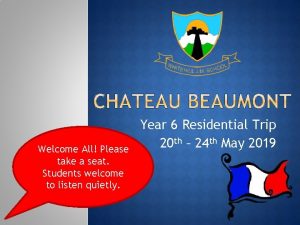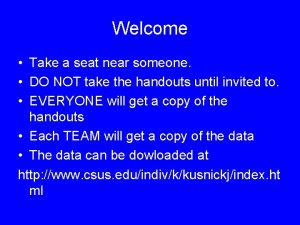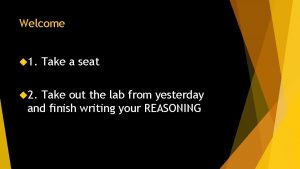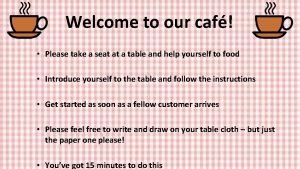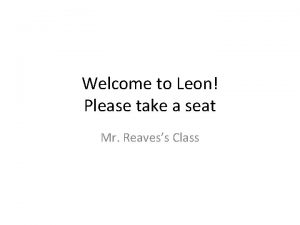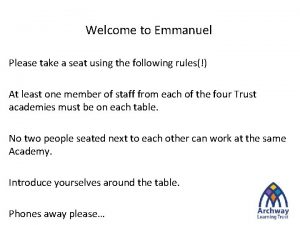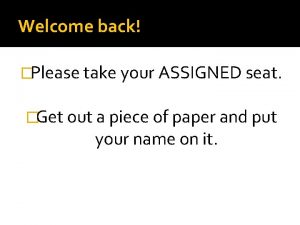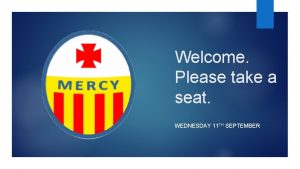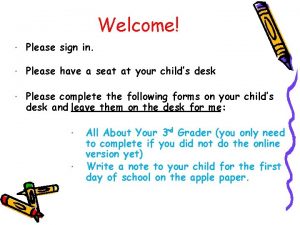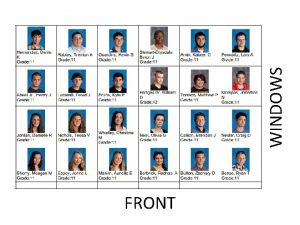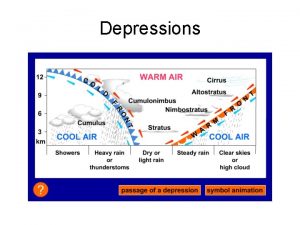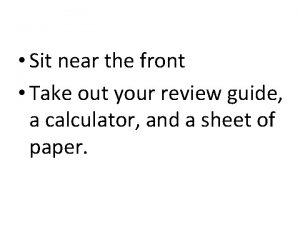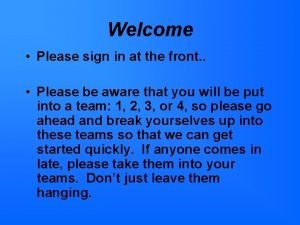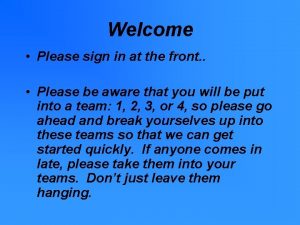Welcome Please take a seat near the front
































- Slides: 32

Welcome! Please take a seat near the front of the lecture theatre. Thank you! facebook. com/NUlibraries @ncl_wdc Writing Development Centre University Library

The MRes Dissertation The Writing Development Centre Contact: wdc@ncl. ac. uk facebook. com/NUlibraries @ncl_wdc Writing Development Centre University Library

Session outline § Planning and drafting: § Formulating clear aims and objectives § What goes where? !: Writing as dialogue § Writing strategies § Editing and proofreading § Editing for structure § Editing for criticality § Proofreading tips facebook. com/NUlibraries @ncl_wdc Writing Development Centre University Library

Part One: Planning and Drafting facebook. com/NUlibraries @ncl_wdc Writing Development Centre University Library

The importance of clear aims and objectives § The dissertation is a research project, not an extended essay § Implications: you need to find something worth writing about and to make a contribution § Not what you will write about but what you will do § Clear aims and objectives are the ‘spine’ of your dissertation and link everything together § They also help create focus and determine relevance facebook. com/NUlibraries @ncl_wdc Writing Development Centre University Library

The one-sentence challenge Can you explain the purpose of your dissertation in one sentence? Have a go! Prompt question What do you want your readers to take away from your dissertation? Writing Prompts “I want to see whether …” “I want to compare and contrast …” “I want to show that …” “I am going to argue that …” facebook. com/NUlibraries @ncl_wdc Writing Development Centre University Library

Refining your aims and objectives Use the following questions to clarify the purpose of your dissertation: § § § What is your dissertation about? What aspects will you focus on? What are you going to do? What question will you answer? What problem does it solve? Why does it need answering/solving? facebook. com/NUlibraries @ncl_wdc Writing Development Centre University Library

Planning techniques: writing as dialogue § Writing is a dialogue, not a monologue § Your job as a writer = to anticipate the readers’ needs and questions § Useful planning strategy in determining what goes where/what each section should do facebook. com/NUlibraries @ncl_wdc Writing Development Centre University Library

What goes where? !: Writing as dialogue Each group will be allocated a different section. List at least two questions you will need to answer for your reader in your given section. § § § Abstract Introduction/Aims of Project Methods Results Discussion Conclusions/Future work facebook. com/NUlibraries @ncl_wdc Writing Development Centre University Library

Readers’ questions: Abstract Good abstracts answer 5 main questions: § § § What did you do? Why did you do it? How did you do it? What were your findings? So what? Why are your findings important? What contribution do they make? What are their implications? facebook. com/NUlibraries @ncl_wdc Writing Development Centre University Library

Readers’ questions: Introduction/Aims of Project § What are you doing? § Why are you doing it? § How does your research fit in with previous studies (literature review element)? § Is there any vital background information I need to know in order to follow what comes next? § What are your aims and objectives? § What do you think the outcome of the study will be (hypothesis)? facebook. com/NUlibraries @ncl_wdc Writing Development Centre University Library

Readers’ questions: Methods § What will you do? § How will you do it? § Why have you chosen this particular approach/rejected others? § What is the relationship between your methodology and those of similar studies? facebook. com/NUlibraries @ncl_wdc Writing Development Centre University Library

Readers’ questions: Results § What did you find? § Anything particularly surprising/unexpected? facebook. com/NUlibraries @ncl_wdc Writing Development Centre University Library

Readers’ questions: Discussion § What are the implications of your results? § How do your results compare to those of previous studies? § Can you account for the results you got (particularly if they weren’t as expected/differ from those of other studies)? § How generalizable are your results? facebook. com/NUlibraries @ncl_wdc Writing Development Centre University Library

Readers’ questions: Conclusions/Future work § Can you remind me what you set out to do and what your key findings were? § What are the implications of your findings? § What were the limitations of your research? § What further experiments could be carried out in this area? § What would be the benefit of carrying out these experiments? facebook. com/NUlibraries @ncl_wdc Writing Development Centre University Library

Useful resource: Academic Phrasebank http: //www. phrasebank. manchester. ac. uk/ facebook. com/NUlibraries @ncl_wdc Writing Development Centre University Library

Writing strategies: approaches to planning Divers: plunge straight into writing before (or instead of) making a plan Patchwork writers: build up a piece of writing by dividing an assignment into sub-sections and working on one bit at a time Grand Plan Writers: have to make very detailed, elaborate plans before starting Architects: devise structure (headings, subheadings etc. ) before content facebook. com/NUlibraries @ncl_wdc Writing Development Centre University Library

Writing strategies: freewriting Eight minutes Write about what you are going to write. § Give yourself a writing prompt § Write in full sentences § Don’t stop! § Don’t edit! § Don’t worry about what you’re writing! § No one is ever going to see this but you! ‘Warming up’ helps you overcome writers’ block and perfectionism, gets you in the mood to write, gives you very rough material to work with later and helps you think flexibly about your topic and capture that thinking facebook. com/NUlibraries @ncl_wdc Writing Development Centre University Library

Writing strategies: freewriting review Two minutes Review what you’ve just written. § Identify any useful bits you might keep § Any interesting bits you might develop § Any bits which aren’t relevant here but are worth exploring elsewhere § Collate useful bits into a brief plan of what you are about to write facebook. com/NUlibraries @ncl_wdc Writing Development Centre University Library

Writing strategies: writing ‘sprints’ § Set a timer for 30 minutes (less or more if preferred!) § Write! § Review and reflect: what do you need to do next? facebook. com/NUlibraries @ncl_wdc Writing Development Centre University Library

Writing strategies: if you get stuck … § Change medium– talk it through, mindmap, doodle or timeline, write by hand § Write about writing – why are you stuck? § Change strategy – choose an approach which is different from your usual working style § Take the pressure off – deliberately write a rough version § Step away – change task or have a break from it § Find out – is there something you’re not sure of or don’t know? facebook. com/NUlibraries @ncl_wdc Writing Development Centre University Library

Part Two: Editing and Proofreading facebook. com/NUlibraries @ncl_wdc Writing Development Centre University Library

Two ‘modes’ of writing § Writing as thinking (writing for yourself) § Writing for an audience (writing to persuade) § Editing is about converting the former into the latter facebook. com/NUlibraries @ncl_wdc Writing Development Centre University Library

Editing for structure Read through the extract on your handout. Consider how well the extract is structured. What techniques did you apply in this reading? facebook. com/NUlibraries @ncl_wdc Writing Development Centre University Library

Editing for structure: improved version Medication is very common in the general population of many countries. Early studies in the 1980 s and 1990 s, studies estimated that approximately 1% of the German population takes up to 10 analgesic tablets every day. In Switzerland, a study of a representative sample of the Swiss population revealed that approximately 4. 4% of men and 6. 8% of women took analgesics at least once a week and 2. 3% took them daily. In Norway, a study of more than 19, 000 subjects showed that 28% of men and 13% of women used analgesics over the preceding 28 -day period, mostly to treat headaches. Moreover, there is convincing evidence to suggest that, within the last few years, triptans and analgesics have become widely overused. In a UK study of 360 migraine patients, 7% used more than 150 doses of triptans during a 12 -month period. These results confirmed observations from an audit of sumatriptan use in Denmark between 1994 and 1995, which showed that 5. 1% of migraine patients took less than one dose a day on average. Furthermore, the review of the first 27 months of sumatriptan treatment in Denmark showed that 1% of patients accounted for 20% of the total consumption. facebook. com/NUlibraries @ncl_wdc Writing Development Centre University Library

Editing for structure § Isolate your topic sentences: do they help you map your overarching argument? § If not, you may be plunging straight into specific detail and need to take a step back. § Think about the wider, more general point you want the reader to take away facebook. com/NUlibraries @ncl_wdc Writing Development Centre University Library

Editing for criticality Read through the extract on your handout. Consider how critical the extract is. What techniques did you apply in this reading? facebook. com/NUlibraries @ncl_wdc Writing Development Centre University Library

Editing for criticality § Try and spot the gaps: have you left any questions unanswered for your reader? § Can you apply the questions ‘how? ’ ‘why? ’ ‘so what? ’ and/or ‘how do you know? ’ to any points you have made? facebook. com/NUlibraries @ncl_wdc Writing Development Centre University Library

Proofreading tips Defamiliarisation is key! § § § View your work in a different format. Read it aloud. Change its appearance. View it in an unusual order. Look at different aspects in isolation: § § § Structure and logical ‘flow’ Reasoning and analysis Style and clarity, quirks and conciseness Grammar, punctuation and spelling Formatting facebook. com/NUlibraries @ncl_wdc Writing Development Centre University Library

The Writing Development Centre Level 2, Robinson Library Undergraduate - Masters - Ph. D Our team of expert tutors offers: - Individual tutorials - Workshops - Online resources Visit us online to book: http: //www. ncl. ac. uk/students/wdc/ HASS – SAg. E - FMS facebook. com/NUlibraries @ncl_wdc Writing Development Centre University Library

The Writing Development Centre Develop your academic skills § Take effective notes • • § Think critically • § Interpret essay • questions § Understand assessment • criteria § Read efficiently • § Argue convincingly • § Plan assignments • § Manage your time § Express ideas confidently Revise effectively Critically review literature Structure essays Use drafting & editing techniques Make the most of lectures & seminars Manage your dissertation or Ph. D thesis Avoid plagiarism Improve your exam technique facebook. com/NUlibraries @ncl_wdc Writing Development Centre University Library

Notice and Take Down Policy Newcastle University seeks to observe the highest standards of compliance with the law and the rights of rights holders, while publishing research and teaching resources to support our students and staff and contribute to academic practice. If you are a rights holder and are concerned that you have found material on our website or legitimately under our name elsewhere, for which you have not given permission, or is not covered by a limitation or exception in laws of the UK or other countries (as relevant), please contact us in writing stating the following: your contact details the full bibliographic details of the materials the exact URL or other location where you found the material proof that you are the rights holder and a statement that, under penalty of perjury, you are the rights holder or are an authorised representative Contact details Email: noticeandtakedown@ncl. ac. uk Web: http: //www. ncl. ac. uk/info/legal/takedown. html
 Welcome please take a seat
Welcome please take a seat Please take a seat
Please take a seat Sit in your seat
Sit in your seat Good morning please have a seat
Good morning please have a seat Good morning please have a seat
Good morning please have a seat Good evening have a seat
Good evening have a seat Come in and ....................... a seat!
Come in and ....................... a seat! Good afternoon please have a seat
Good afternoon please have a seat Please sit down and your seat belts
Please sit down and your seat belts Good afternoon please have a seat
Good afternoon please have a seat Back seated valve
Back seated valve Near hip near shoulder tackling
Near hip near shoulder tackling The school is ...the post office. next to near across from
The school is ...the post office. next to near across from Nobody said anything raymond carver
Nobody said anything raymond carver Where can i take forklift classes near me
Where can i take forklift classes near me Use excessive force if things don't quite slip into place
Use excessive force if things don't quite slip into place Please do not throw sausage pizza away
Please do not throw sausage pizza away Please take notes
Please take notes Please take out some time
Please take out some time Slam poetry rubric
Slam poetry rubric Please take notes
Please take notes In on near next to
In on near next to Please extend your warm welcome
Please extend your warm welcome Welcome please sign in
Welcome please sign in Take a bus or take a train
Take a bus or take a train Dead front vs live front transformer
Dead front vs live front transformer Weather fronts drawing
Weather fronts drawing Cover page for school magazine
Cover page for school magazine Wise men three clever are we
Wise men three clever are we Tư thế worms-breton
Tư thế worms-breton ưu thế lai là gì
ưu thế lai là gì Thẻ vin
Thẻ vin Cái miệng nó xinh thế
Cái miệng nó xinh thế
